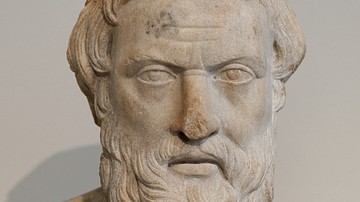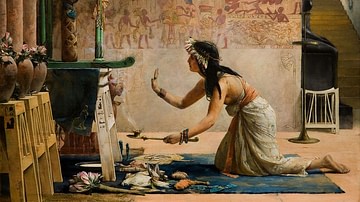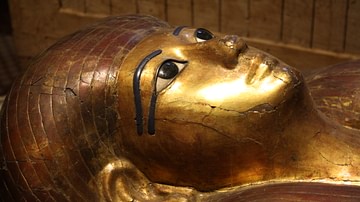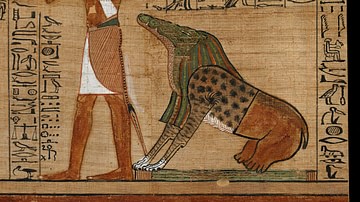II:35. The Egyptians in agreement with their climate, which is unlike any other, and with the river, which shows a nature different from all other rivers, established for themselves manners and customs in a way opposite to other men in almost all matters: for among them the women frequent the market and carry on trade, while the men remain at home and weave; and whereas others weave pushing the woof upwards, the Egyptians push it downwards: the men carry their burdens upon their heads and the women upon their shoulders: the women make water standing up and the men crouching down: they ease themselves in their houses and they eat without in the streets, alleging as reason for this that it is right to do secretly the things that are unseemly though necessary, but those which are not unseemly, in public: no woman is a minister either of male or female divinity, but men of all, both male and female: to support their parents the sons are in no way compelled, if they do not desire to do so, but the daughters are forced to do so, be they never so unwilling.
II:36. The priests of the gods in other lands wear long hair, but in Egypt they shave their heads: among other men the custom is that in mourning those whom the matter concerns most nearly have their hair cut short, but the Egyptians, when deaths occur, let their hair grow long, both that on the head and that on the chin, having before been close shaven: other men have their daily living separated from beasts, but the Egyptians have theirs together with beasts: other men live on wheat and barley, but to any one of the Egyptians who makes his living on these it is a great reproach; they make their bread of maize, which some call spelt; they knead dough with their feet and clay with their hands, with which also they gather up dung: and whereas other men, except such as have learnt otherwise from the Egyptians, have their members as nature made them, the Egyptians practise circumcision: as to garments, the men wear two each and the women but one: and whereas others make fast the rings and ropes of the sails outside the ship, the Egyptians do this inside: finally in the writing of characters and reckoning with pebbles, while the Hellenes carry the hand from the left to the right, the Egyptians do this from the right to the left; and doing so they say that they do it themselves rightwise and the Hellenes leftwise: and they use two kinds of characters for writing, of which the one kind is called sacred and the other common.

II:37. They are religious excessively beyond all other men, and with regard to this they have customs as follows: they drink from cups of bronze and rinse them out every day, and not some only do this but all: they wear garments of linen always newly washed, and this they make a special point of practice: they circumcise themselves for the sake of cleanliness, preferring to be clean rather than comely. The priests shave themselves all over their body every other day, so that no lice or any other foul thing may come to be upon them when they minister to the gods; and the priests wear garments of linen only and sandals of papyrus, and any other garment they may not take nor other sandals; these wash themselves in cold water twice in the day and twice again in the night; and other religious services they perform (one may almost say) of infinite number. They enjoy also good things not a few, for they do not consume or spend anything of their own substance, but there is sacred bread baked for them and they have each great quantity of flesh of oxen and geese coming in to them each day, and also wine of grapes is given to them; but it is not permitted to them to taste of fish: beans moreover the Egyptians do not at all sow in their land, and those which grow they neither eat raw nor boil for food; nay the priests do not endure even to look upon them, thinking this to be an unclean kind of pulse: and there is not one priest only for each of the gods but many, and of them one is chief-priest, and whenever a priest dies his son is appointed to his place.
II:50. Moreover the naming of almost all the gods has come to Hellas from Egypt: for that it has come from the Barbarians I find by inquiry is true, and I am of opinion that most probably it has come from Egypt, because, except in the case of Poseidon and the Dioscuroi (in accordance with that which I have said before), and also of Hera and Hestia and Themis and the Charites and Nereïds, the Egyptians have had the names of all the other gods in their country for all time. What I say here is that which the Egyptians think themselves: but as for the gods whose names they profess that they do not know, these I think received their naming from the Pelasgians, except Poseidon; but about this god the Hellenes learnt from the Libyans, for no people except the Libyans have had the name of Poseidon from the first and have paid honour to this god always. Nor, it may be added, have the Egyptians any custom of worshipping heroes.
II:64. The Egyptians were the first who made it a point of religion not to lie with women in temples, nor to enter into temples after going away from women without first bathing: for almost all other men except the Egyptians and the Hellenes lie with women in temples and enter into a temple after going away from women without bathing, since they hold that there is no difference in this respect between men and beasts: for they say that they see beasts and the various kinds of birds coupling together both in the temples and in the sacred enclosures of the gods; if then this were not pleasing to the god, the beasts would not do so.
II:65. Thus do these defend that which they do, which by me is disallowed: but the Egyptians are excessively careful in their observances, both in other matters which concern the sacred rites and also in those which follow: Egypt, though it borders upon Libya, does not very much abound in wild animals, but such as they have are one and all accounted by them sacred, some of them living with men and others not. But if I should say for what reasons the sacred animals have been thus dedicated, I should fall into discourse of matters pertaining to the gods, of which I most desire not to speak; and what I have actually said touching slightly upon them, I said because I was constrained by necessity. About these animals there is a custom of this kind: persons have been appointed of the Egyptians, both men and women, to provide the food for each kind of beast separately, and their office goes down from father to son; and those who dwell in the various cities perform vows to them thus, that is, when they make a vow to the god to whom the animal belongs, they shave the head of their children either the whole or the half or the third part of it, and then set the hair in the balance against silver, and whatever it weighs, this the man gives to the person who provides for the animals, and she cuts up fish of equal value and gives it for food to the animals. Thus food for their support has been appointed: and if any one kill any of these animals, the penalty, if he do it with his own will, is death, and if against his will, such penalty as the priests may appoint: but whosoever shall kill an ibis or a hawk, whether it be with his will or against his will, must die.
II:82. Besides these things the Egyptians have found out also to what god each month and each day belongs, and what fortunes a man will meet with who is born on any particular day, and how he will die, and what kind of a man he will be: and these inventions were taken up by those of the Hellenes who occupied themselves about poesy. Portents too have been found out by them more than by all other men besides; for when a portent has happened, they observe and write down the event which comes of it, and if ever afterwards anything resembling this happens, they believe that the event which comes of it will be similar.
II:83. Their divination is ordered thus: the art is assigned not to any man, but to certain of the gods, for there are in their land Oracles of Heracles, of Apollo, of Athene, of Artemis, of Ares, and of Zeus, and moreover that which they hold most in honour of all, namely the Oracle of Leto which is in the city of Buto. The manner of divination however is not yet established among them according to the same fashion everywhere, but is different in different places.
II:84. The art of medicine among them is distributed thus: each physician is a physician of one disease and of no more; and the whole country is full of physicians, for some profess themselves to be physicians of the eyes, others of the head, others of the teeth, others of the affections of the stomach, and others of the more obscure ailments.





